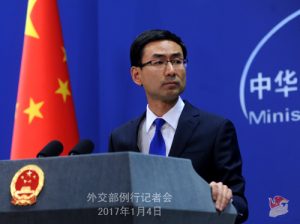
Underlining its solidarity with India in the wake of the Pulwama suicide attack, China has termed terrorism “the common enemy of mankind” and exhorted all countries in the region to jointly address this growing threat.
In a condolence message to External Affairs Minister Sushma Swaraj on February 15, Chinese State Councilor and Foreign Minister Wang Yi, on behalf of the Chinese government, expressed “deep sympathy” to the families of the victims and “sincere condolences” to those wounded in the devastating terror attack that killed 40 personnel of Central Reserve Police Force (CRPF). The attack was engineered by a suicide bomber who rammed his vehicle into the bus carrying CRPF personnel in south Kashmir’s Pulwama district on February 14.
In his message, Mr Wang expressed “shock”” at the suicide attack in Kashmir and stressed that “terrorism is the common enemy of mankind.” “The Chinese side resolutely opposes and strongly condemns all forms of terrorism,” said the message. “Countries in the region should enhance cooperation, jointly address the threat of terrorism and maintain regional peace and security.”
Jaish e-Mohammed, the banned terrorist organisation which is widely suspected to be controlled by Pakistan, has claimed responsibility for the Pulwama terror attack.
As part of its diplomatic campaign to isolate Pakistan over its alleged involvement in the Pulwama terror attack, India’s Foreign Secretary Vijay Gokhale briefed all the envoys of veto-wielding members of the UN Security Council, including China’s ambassador to India Luo Zhaohui.

China, however, treaded cautiously on the India-backed proposal for designation of Jaish e-Mohammed chief Masood Azhar as a global terrorist by the UN Security Council.
“As for the issue of listing, I could tell you that the 1267 Committee of Security Council has a clear stipulation on the listing and procedure of terrorist organisations,” Chinese Foreign Ministry spokesperson Geng Shuang said when asked about China’s stand on the UNSC listing of Azhar.
Expanding counter-terror cooperation was identified as a major focus area of China-India engagement during the first informal summit meeting between Prime Minister Narendra Modi and Chinese President Xi Jinping in Wuhan in April 2018.

The two leaders had also decided to expand bilateral security cooperation. In sync with the Wuhan understanding, India and China signed their first-ever security pact during the visit of Chinese State Councilor and Minister of Public Security Zhao Kezhi to India in October 2018.
The security pact envisages, among other things, enhanced counter-terror cooperation, combating organised crime, drugs and human trafficking, intelligence sharing, exchange programme, sharing of best practices and cooperation in disaster mitigation.
Author Profile
- India Writes Network (www.indiawrites.org) is an emerging think tank and a media-publishing company focused on international affairs & the India Story. Centre for Global India Insights is the research arm of India Writes Network. To subscribe to India and the World, write to editor@indiawrites.org. A venture of TGII Media Private Limited, a leading media, publishing and consultancy company, IWN has carved a niche for balanced and exhaustive reporting and analysis of international affairs. Eminent personalities, politicians, diplomats, authors, strategy gurus and news-makers have contributed to India Writes Network, as also “India and the World,” a magazine focused on global affairs.
Latest entries
 DiplomacyJanuary 5, 2026India walks diplomatic tightrope over US operation in Venezuela
DiplomacyJanuary 5, 2026India walks diplomatic tightrope over US operation in Venezuela India and the WorldNovember 26, 2025G20@20: Africa’s Moment – The Once and Future World Order
India and the WorldNovember 26, 2025G20@20: Africa’s Moment – The Once and Future World Order DiplomacyOctober 4, 2025UNGA Resolution 2758 Must Not Be Distorted, One-China Principle Brooks No Challenge
DiplomacyOctober 4, 2025UNGA Resolution 2758 Must Not Be Distorted, One-China Principle Brooks No Challenge India and the WorldJuly 26, 2025MPs, diplomats laud Operation Sindoor, call for national unity to combat Pakistan-sponsored terror
India and the WorldJuly 26, 2025MPs, diplomats laud Operation Sindoor, call for national unity to combat Pakistan-sponsored terror







